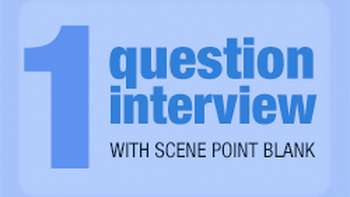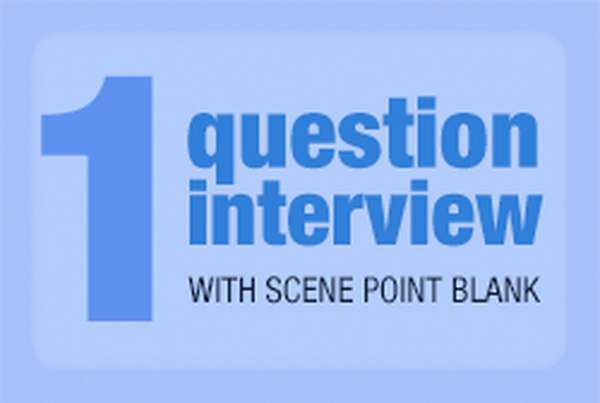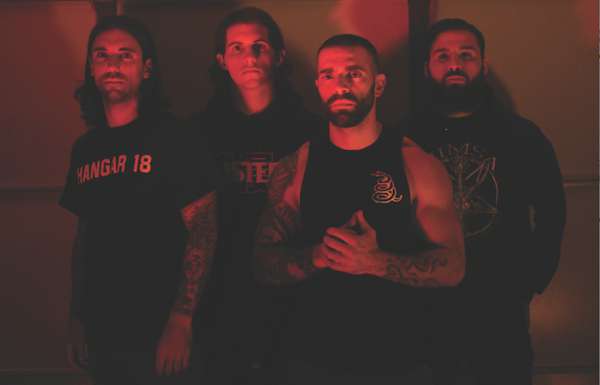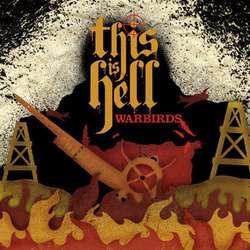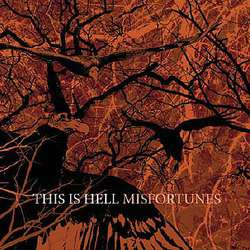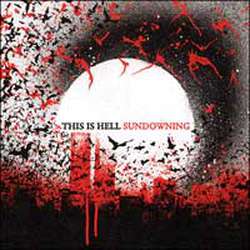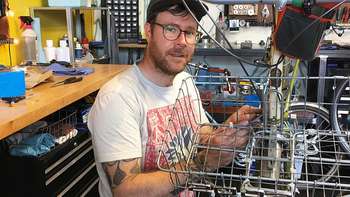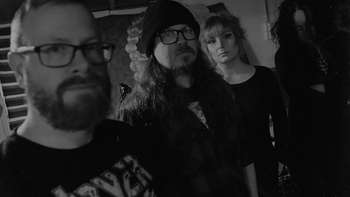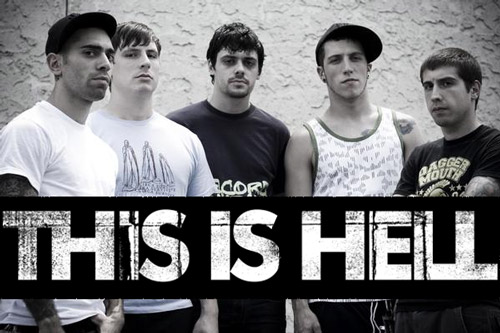
Bands blow up; they turn heads, impressing critics and fans alike. Bands capitalize on that momentum doing long stretches of touring, hoping to solidify themselves as a force in their respected scene. Too often people will label them as being "the hardest working band in _____." That might be true, but only at that moment. If any band has the resume to earn such the title, it would be This is Hell. After two EPs, a full-length, and hundreds of thousands of miles spent on the road playing with any band that might fall under the banner of "punk," Scene Point Blank spoke to guitarist Rick Jiminez and bassist Johnny Moore about life in This is Hell and their recently released album Misfortunes.
Scene Point Blank: If I remember correctly This Is Hell toured Europe with only a demo. That takes courage. Now that you have two full-lengths and two EPs/7"s has touring gotten any easier? Is playing regions you barely touch more of a possibility? Do you have better accommodations? Could you talk about the tour with Gallows, I read the show in Brooklyn didn't go over so well; was it very different from the New York City show and how did it compare to the other dates?
Rick Jiminez: Yeah we did tour Europe with only a demo/7". We also did about three or four U.S. tours and got into Canada with just that too. After releasing the EP, then Sundowning and now Misfortunes, touring hasn't gotten easier per se, but we have more options because of our experience and the name has been around longer etc. For example, we hadn't ever played in Oklahoma until this past summer, but once we finally got there, it was awesome. There are still a lot of places we haven't been that we really want to get to. All in due time I suppose. We still tour in a van with a trailer though. We don't have any plans of changing that anytime soon. Despite was some people may think, there is no money to be made in hardcore. The Gallows tour was okay. The ticket prices were too high for my liking and the venue choices were pretty whack. The majority of the venues were way too big and way too "barriers and security guards" than they should have been and I think that really hurt everyone involved in the shows. The bands, the kids, the vibe, everything. The Brooklyn show was okay, but another victim of what I mentioned before. If it had been more of a hardcore type feel, the show would have been a lot cooler. I'm not into the whole "big stage" thing. I don't need an ego ramp, a big backstage room, or a multi-thousand dollar sound system to enjoy a show.
Johnny Moore: I wasn't in the band while they were touring on the demo alone - I joined following the release of Sundowning and my first shows were in August of 2006. Touring at any level will always have its ups and downs. I've been lucky enough to be a part of so many great tours with this band so far. All the bands we've supported have treated us well and we've been on the road playing shows with some great bands since I joined This is Hell. As far as accommodations go, sometimes we get a room to change in and some decent snack food...that's all we can really ask for. I had fun on the Gallows tour. We met those guys over a year ago just before the ball really got rolling for their band, and they were just as cool this time around as they were when we first met. The Brooklyn show was a good time, although if it had been booked in a smaller room and the kids were packed in it would have been a better time for sure. That was pretty much the greatest flaw with the tour in general; the rooms were just too big. I don't really know why it went down that way; some entertainment politics were probably at play. Gallows and Cancer Bats were great bands to be on tour with, and we played some shows with Vultures United and She Rides as well, also solid dudes. The New York City show was one of the better dates on the tour. It was the closest to a hometown show for us so we were stoked to be playing in front of some friends and family again, especially after having to miss a handful of dates on the tour due to some horrible weather conditions. I'll always remember the Philly, Worcester and both New York shows because we had had been away from the tour for a while and it was great to play again and finish out the tour.
Scene Point Blank: Blacklisted has a song titled "Tourist" which talks about the pitfalls of touring; how it's a wonderful experience but you become disconnected from friends and family. It's rare that This is Hell isn't on tour. Does it affect your home lives a lot? Has it gotten to the point where you almost feel more comfortable on the road?
Rick Jiminez: I wouldn't say being on the road is more comfortable, although we spend more time on the road than at home by far. The disconnect you feel from constantly being away is very real though and extremely strenuous. The song does say it all?it's a great experience, and for me it's the outlet I NEED in life, but it definitely fucks with the rest of your life. Maintaining friendships, relationships, and obligations?all that shit becomes so hard. Not impossible, but really hard.
Johnny Moore: I try my best to feel comfortable both on tour and on the road. I've been playing music for over ten years, and I've been waiting a long time to have the chance to tour in a full-time band. Everyone at home is really supportive of what I'm doing at this point in my life; so being home is never tough. Of course I hate having to work while I'm home to pay my bills and make ends meet, but it helps keep me grounded and continue looking forward to the next tour.
Scene Point Blank: I've seen you play with a vast array of bands from Bayside to Bane to Sounds of Underground; is there a particular sub-genre you feel most comfortable with? When you opened for Bayside, Travis opened the set by saying, "You're gonna hate us." I mean no disrespect by the question but I ask this because I've seen you play and, at times, the crowd just slept on you. Other times they ripped shit up. Do you think it more of a regional issue or even a show-by-show basis?
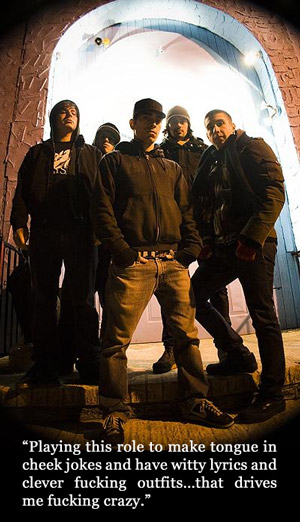 Rick Jiminez: I think it's both. Certain crowds like us more than others, and certain areas will support us more than others. At a hardcore show, we are most at home, but there are some places we can play where kids will come out and support us and go nuts regardless of what type of show we play. It is relatively inconsistent though. The majority of the Sounds of the Underground Tour kids were bored while we played and didn't give a shit. We like to do different things and different types of tours here and there, so we figured the metal crowd might see something in us and be siked, but they really weren't that much. We figured the Bayside tour would be terrible for us but we gave it a chance and it wound up being radical and kids got into us. We are a lot closer in sound to a band like Darkest Hour than Bayside but it worked opposite of that assumption. When we do a tour with Comeback Kid or Bane though, that is when shit is the sickest and we have the most fun. Kids get it the most and understand our message and energy.
Rick Jiminez: I think it's both. Certain crowds like us more than others, and certain areas will support us more than others. At a hardcore show, we are most at home, but there are some places we can play where kids will come out and support us and go nuts regardless of what type of show we play. It is relatively inconsistent though. The majority of the Sounds of the Underground Tour kids were bored while we played and didn't give a shit. We like to do different things and different types of tours here and there, so we figured the metal crowd might see something in us and be siked, but they really weren't that much. We figured the Bayside tour would be terrible for us but we gave it a chance and it wound up being radical and kids got into us. We are a lot closer in sound to a band like Darkest Hour than Bayside but it worked opposite of that assumption. When we do a tour with Comeback Kid or Bane though, that is when shit is the sickest and we have the most fun. Kids get it the most and understand our message and energy.
Johnny Moore: We will always play shows with bands in different genres. I never want touring and playing shows to get stale or boring. As long as we think a band is good at what they do and is putting on a show that we want to be part of, we will play. We all want to reach kids that listen to different styles of music other than hardcore, as well as kids that listen solely to hardcore bands. I'm sure kids have "slept" on us at hardcore shows and at other shows that we've played, and I'm sure we've impressed kids and won them over at both as well. Both scenarios are bound to happen when you're a performer for the length of your career. You can't go into a show wondering about the crowd and worrying if they're going to be into you or not, you've just got to go out there and give the kids that came to the show and paid their money everything you've got, whether they were excited about it or not.
Scene Point Blank: Misfortunes has less of a metal tinged sound, sounding closer to earlier era hardcore records, with a lot of nuances of New York bands. Also there is a lot more melody in the vocals and the guitar parts. Was this a natural progression as songwriters?
Rick Jiminez: Yeah, definitely. I think we have become much better songwriters on this album, without being afraid to throw in some melody here and there as well as not being afraid to go balls out on the aggressive side. The album is very expressive and extreme. We tried a handful of new things but the way we did it, those new things still sounds very much like This is Hell. The evolution on this album was very smooth for us. As far as New York bands, those are the bands that got me siked on hardcore to begin with. Outside of D.R.I. and Minor Threat, the first hardcore bands I really fell in love with were NYHC bands.
Johnny Moore: Rick and I have been writing songs together since we both started playing instruments, and we always try to progress when we write from where we were in the past. We don't want to write the same songs now that we were writing when we were sixteen or twenty. This was also my first record with this particular band, so we wanted to put our best foot forward and start fresh. Chris is also contributing to the songwriting for the first time on Misfortunes, so he and I brought a sense of melody to the band that may not have been there before. New members and their particular influences will always change the subtle nuances of a band. New York hardcore bands are a major part of what we all listen to (Sick of it All, Madball, H20, Cro-Mags, Gorilla Biscuits, etc.), and have inspired this band since its inception, so this record should be no different. I think the fact that I listen to a lot of melodic bands may have effected how I went about writing the vocal patterns for this record. After putting the lyrics together I fit them to the music in the most logical way possible for me, and if that came out in a slightly melodic way, so be it. As far as the guitar playing goes, Rick and Chris are both phenomenal at their instrument and are always willing to think outside the box a bit; so that leads to the use of different chords that may not be present in the arrangement of a typical hardcore song. We're not trying to re-write the book on hardcore songwriting, but we are trying to add something fresh and different; something we want to hear as well as something listeners across the board may appreciate.
Scene Point Blank: What significance do bands like Tragedy play in your sound? You're a hardcore band no doubt, but your songs include a lot of heavy melodies found in crust and d-beat bands not typically found in the type of hardcore you're best associated with. If Tragedy type bands have little influence to your band, whom would you cite as influences to that aspect of your sound?
Rick Jiminez: Honestly, I've heard Tragedy for about forty-five seconds in my entire life. I think the heavy melodies and other minor harmonies all stem from my love of and my upbringing with Megadeth, early Metallica, Queensryche and bands of that nature. I don't really listen to heavier crust and d-beat bands. Just wasn't my thing. I should look into it more; I might be into it.
Johnny Moore: I'm not familiar with Tragedy, but This is Hell has always been a heavy band, and this time out I think melody just kind of snuck its way in. I know Rick listens to Failure and Bayside, Chris loves Fat Wreck Chords bands, we all like Rise Against and Comeback Kid. Bands with melodic leanings make up the majority of what I like to listen to at home.
Scene Point Blank: Did you change lyricists for this album? I thought Jeff had written the lyrics for earlier stuff while I know Travis wrote for Scraps and Heart Attacks? Please clear up the confusion.
Rick Jiminez: Yeah. Once Jeff left the band, our new bass player Johnny took over as lead lyricist. He wrote the vast majority of Misfortunes and I had a hand in it as well. It was awesome being able to write such a focused record in conjunction with Johnny. The music and the lyrics compliment each other perfectly. He would know exactly what the song was about while just hearing it on guitar.
Johnny Moore: Travis wrote the lyrics for Scraps and for the This is Hell demo. Jeff wrote the lyrics for the This is Hell EP and Sundowning - he was also the lyricist/singer for a Long Island band called The Backup Plan and currently sings for a band called Ice Age. When Jeff left the band he passed the lyric writing and vocal arranging duties on to me. When I first moved back to Long Island to join This is Hell I didn't know I was going to be writing words, but it was a responsibility I embraced. Rick and I worked together on "Remnants" and Rick wrote "Memoirs." The rest of the stuff I wrote over the last two years or so.
Scene Point Blank: I went to Long Island (Seaford) for the first time last week. While it's eerily suburban, it looked rather safe and comfy making for an okay life. Thinking about that, where do all the dark themes in your lyrics come from?
Rick Jiminez: Well there are plenty of other places on Long Island. Seaford is a real nice area. Much of Long Island is nice and suburban and the cost of living is really fucking high. Even the area I grew up in was relatively nice. Being a poor Hispanic kid in a shit part of town surrounded by rich white kids and going to a rich white school was shitty, but it shaped me and I wouldn't give that up for anything. Aside from surroundings and environment, there are always going to be other things influencing your mindset and outlook. The majority of hardships that take place in someone's life in a fucked up area are going to occur even in a nice area. Now think about that but always living in the armpit of said "nice area".
Johnny Moore: The comfortable, safe ambiance of Long Island can bring a lot of depressing feelings to someone trying to survive there. There's a lot of pressure to get a "real job" and fall into the average-income, middle-class, family setting. Kids that want to be on tour and play in bands and deal with being broke all the time will always be on the outside in a place like Long Island, where so many kids grow up wealthy and having everything handed to them. The atmosphere on Long Island is conducive to short, fair-weather friendships and relationships, and being in a touring band will always bring hardships at home. Long Island is cushy for a lot of people, but it's never really been that way for us. We all come from hard-working families, and we're trying our best to make a decent life for ourselves doing this while living on Long Island, but the odds of that happening aren't really in our favor. Although I'm pretty sure none of us would have it any other way?except for Chris, he's from upstate New York, so his mind is warped in a different way.
Scene Point Blank: Could you talk about the song "You are the Antithesis?" Clearly it's a song about bands and fans that use hardcore, or any music scene, as a social crutch. This has been the basis for countless hardcore songs so why include one on your album? Are there still things that need to be said? Have certain conditions made it easier for insincere people adopt the scene?
Rick Jiminez: Absolutely! This has become more and more of an issue with me as I travel more, seeing not only scenes throughout the world, but seeing bands, and how they function, and think it's complete bullshit. This is something that was greatly affecting our moods and mindsets, and that's what the whole album is about: our moods and mindsets. I take hardcore extremely personal. It's not just a style of music, or a lifestyle, it's my way of thinking. It's my lifeblood. It's what I've devoted my life to. When I see someone or a band using it to get to a certain level, or to gain notoriety, it's fucking disgusting and insulting. Even past that, the song is about people coming on stage and putting out CD's, but not saying anything whatsoever. Playing this role to make tongue in cheek jokes and have witty lyrics and clever fucking outfits?that drives me fucking crazy. I got involved in hardcore because it was an alternative to all the mainstream bullshit and it actually had something to say. I became involved because the music was something I could relate to and find solace in. All too often I am let down by what a band is about and I find myself disconnected from what they stand behind. There's a line in the song that says, "What are we to do when the last great poet throws down his pen?" and that's how I feel sometimes. I came to hardcore because the music and lyrics moved me and expressed what I couldn't always put into words. I see so many bands now without any type of message beyond self-glorification and "clever witty" trendy bullshit; drives me fucking insane. I pour my heart into every chord and every lyric written because it is my outlet and because it is what we owe to hardcore after being given this forum to express ourselves.
Johnny Moore: Yeah, I think you're right on the money with your explication of that song. Sure other bands have criticized their peers, or used their band as a forum to comment on bands or musicians in their genre, but I don't think any song out there is on the same wavelength as "You are the Antithesis." I really look up to a lot of bands and musicians, and in the last year and a half I've spent touring with this band, I've gotten really bummed at a lot of what I've seen on stage. Granted, touring with bands like Bane and Strike Anywhere has provided me with enough inspiration to keep going on playing music for the next five years, but I've also witnessed a lot of the opposite. With the existence of Myspace for promotion and instant access to pseudo rock-stardom, and simpler methods for booking tours and getting on the road, so many more insincere bands, that years ago wouldn't have put any effort into getting on the road, are playing shows every night to kids who put them on a pedestal. I'm not saying that kids have to look up to dudes in bands, but I personally look up to so many musicians for their accomplishments, and I would love to see more bands with something to say and who are doing it for the right reasons - whether it be a release of aggression, to send out a positive message, or just connect with other people. No one should be viewed as larger than life, and no one should think he/she is for that matter. There's got to be more to it than a catch phrase and a good time as far as I'm concerned. There's definitely more than can be said, and I look forward to hearing the next hardcore song with a similar sentiment to our song. Every songwriter can put a different spin on an idea, whether it is a social commentary, abstract idea, or just plain-old emotional poetry, and I'm open to it all as long as it's heart-felt and honest.
The aspect of "You Are the Antithesis" that really sets it apart from the other hardcore songs you're referencing is that, although I see my fair share of musicians who are exactly the opposite of who we think they should be, this is not simply calling them out or complaining about it. This song offers up some alternative ideas on how to bring about change. It acknowledges that great writers do exist and there may be more out there that haven't' been discovered or found themselves yet. I really think that a lot of these guys have what it takes to really reach an audience, they are just afraid to let it out because they feel being exposed as having emotions or being vulnerable. There's nothing vulnerable about honesty and saying what you really feel, and i honestly feel that in the long-term it will get you further than giving here today-gone tomorrow fans what they want to hear, or just simply filling space between mosh parts with throw away lyrics that are easy to digest and leave nothing to the listener's imagination. I think that if a lot of musicians dug a little deeper, they'd find being a band that much more gratifying, and at the same time give kids something to relate to and possibly believe in.
Words: Scottie
Graphics: Matt
- This is Hell Official Site: http://www.thisishell.org/
